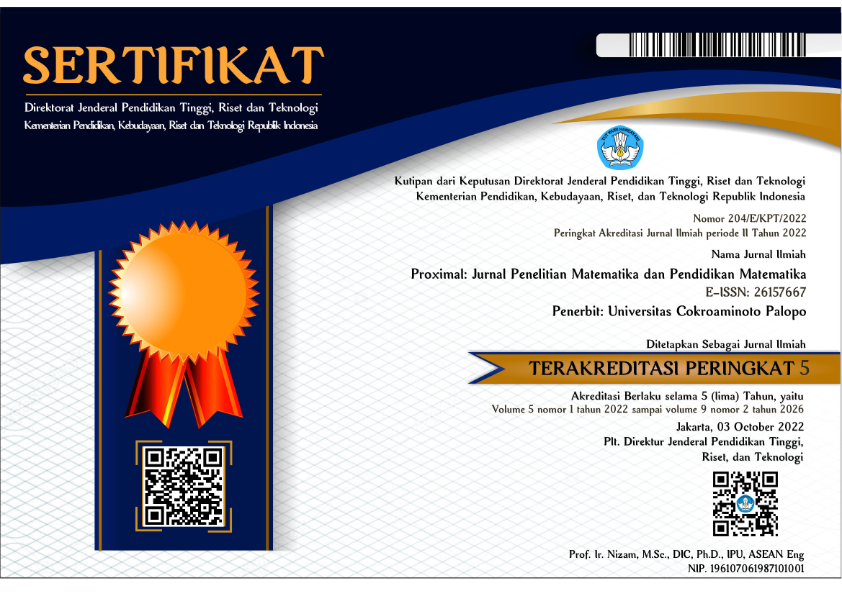Analisis Konsep Diri Dan Kebiasaan Belajar Matematika Siswa
DOI:
https://doi.org/10.30605/proximal.v6i2.2900Keywords:
Self-Concept, Habit of Learning, MathematicsAbstract
This research is motivated by the large number of students who have low self-concept and study habits. The aims of this study are: 1) To find out self-concept in students in class VII MTsN 3 Agam. 2) To find out the study habits of students in class VII MTsN 3 Agam. This research uses quantitative descriptive research. The research population was class VII MTsN 3 Agam in the 2022/2023 academic year, with a total of 160 students and the research sample was taken by simple random sampling consisting of 32 students. The instrument that the researcher used in this study was a questionnaire instrument for self-concept and study habits. The collected data were analyzed and determined from the students' self-concept and study habits by means of a percentage. The results of the study showed that the percentage of self-concept in class VII students of MTsN 3 Agam was 78.125% in the moderate category. And the percentage of study habits in class VII students of MTsN 3 Agam is 68.75% in the moderate category.
Downloads
References
Agustyaningrum, N & Silfia, S. 2010. “Hubungan Kebiasaan Belajar Dan Kepercayaan Diri Dengan Hasil Belajar Matematika Siswa Kelas VIII SMP N 27 BATAM”, Jurnal Ilmiah Pendidikan Matematika, P-ISSN:2502-7638; E-ISSN: 2502-8391 Vol 1, No 2 DOI: https://doi.org/10.26877/jipmat.v1i2.1242
Brookover, W. B., Thomas, S., & Paterson, A. (1964). Self-concept of ability and school achievement. Sociology of education, 271-278. DOI: https://doi.org/10.2307/2111958
Burns, R. B. 1993. Konsep Diri (Teori, Pengukuran, Perkembangan, dan Perilaku). Alih bahasa: Eddy. Jakarta: Arcan
Djaali. 2014. Psikologi Pendidikan. Jakarta: Bumi Aksara
Fifari & Winarso, 2020, “Kecemasan dan Kebiasaan Belajar Matematika terhadap Keterampilan Berpikir Kritis Siswa”, Susska Jurnal of Mathematics Education, Vol 6, No 1
Indra, M., Munadi, S., & Widari, T. (2023). The Correlation of Motivation and Habit with Learning Outcomes in New Normal Era. Jurnal Iqra': Kajian Ilmu Pendidikan, 8(1), 51-70. DOI: https://doi.org/10.25217/ji.v8i1.2749
Jansen, M., Scherer, R., & Schroeders, U. (2015). Students' self-concept and self-efficacy in the sciences: Differential relations to antecedents and educational outcomes. Contemporary Educational Psychology, 41, 13-24. DOI: https://doi.org/10.1016/j.cedpsych.2014.11.002
Jiusto, S., & DiBasio, D. (2007). The habit of learning. ASEE Prism, 17(3), 51.
Kamarullah, 2017, Pendidikan Matematika Di Sekolah Kita, Khawarizmi Jurnal Pendidikan dan Pembelajaran Matematika, Vol. 1, No. 1 DOI: https://doi.org/10.22373/jppm.v1i1.1729
Kartono, K. 1996, Psikologi Umum, Jakarta: Mandar Maju, cet ke-3
Magfirah, I, 2015, Pengaruh Konsep Diri Dan Kebiasaan Belajar Terhadap Hasil Belajar Matematika Siswa Kelas VIII Smp Negeri 6 Bontomatene Kepulauan Selayar, Jurnal Matematika dan Pembelajaran, Vol 3, No 1
Manurung, S.A, 2020, “Pengaruh Konsep Diri Terhadap Hsil Belajar Matematika Siswa Kelas IV SDN Kenari 07 Pagi Jakarta”, Jurnal Ilmu Pendidikan, Vol 5, No 2
Nina, 2012, Psikologi Sosial Sebagai Akar Ilmu Komunikasi, Bandung, Simbiosa Rekatama Media
Ningsih. G, 2017, “Hubungan Rasa Percaya Diri Dan Kebiasaan Belajar Terhadap Hasil Belajar Matematika Siswa Kelas IX SMP Negeri 16 Batam Tahun Pelajaran 2016/2017, Pythagoras, 6(1”), ISSN Cetak 2301-5314 DOI: https://doi.org/10.33373/pythagoras.v6i1.1038
Rahayu, M.M., 2015, Pengaruh Kebiasaan Belajar Terhadap Hasil Belajar Matematika, Journal of Elementary Education, Vol 4, No 1
Rahman, 2022, Pengertian Pendidikan, Ilmu Pendidikan Dan Unsur-Unsur Pendidikan, Al Urwatul Wutsqa: Kajian Pendidikan Islam ISSN: 2775-4855, Vol 2, No 1
Rahmat, J. 2000. Psikologi Komunikasi. Bandung: Remaja Rosdakarya
Rosida. F, dkk, 2016, “Pengaruh Kebiasaan Belajar dan Self-Efficacy Terhadap Hasil Belajar Geografi di SMA”, Jurnal Pendidikan Geografi, Tahun 21, No 2, Juni DOI: https://doi.org/10.17977/um017v21i22016p017
Sarwiyatin, 2014, Pengaruh Sikap Belajar Dan Kebiasaan Belajar Terhadap Hasil Belajar Geografi Peserta Didik SMA Negeri 1 Ponggok Kecamatan Ponggok Kabupaten Blitar, Jurnal Ilmiah. Fakultas Keguruan dan Ilmu Pendidikan, Vol 19, No 1 DOI: https://doi.org/10.30998/formatif.v1i3.77
Siagian, 2019, “Pengaruh Minat dan KebiasaanBelajar Siswa Terhadap Prestasi Belajar Matematika”, Jurnal Formatif 2(2) DOI: https://doi.org/10.30822/asimtot.v2i2.771
Slameto, 1995, Belajar dan Faktor-Faktor Yang Mempengaruhinya, Jakarta: PT Rineka Cipta
Suherman, E. dkk. 2003, Strategi Pembelajaran Matematika Kontemporer, Bandung: UPI
Thalib, S.B., 2010, Psikologi Pendidikan Berbasis Analisis Empiris Aplikatif, Jakarta: Kencana
Yayuk. E, 2019. Pembelajaran Matematika SD, Malang: Universitas Muhammadiyah Malang
Downloads
Published
How to Cite
Issue
Section
License
In submitting the manuscript to the journal, the authors certify that:
- They are authorized by their co-authors to enter into these arrangements.
- The work described has not been formally published before, except in the form of an abstract or as part of a published lecture, review, thesis, or overlay journal.
- That it is not under consideration for publication elsewhere,
- That its publication has been approved by all the author(s) and by the responsible authorities – tacitly or explicitly – of the institutes where the work has been carried out.
- They secure the right to reproduce any material that has already been published or copyrighted elsewhere.
- They agree to the following license and copyright agreement.
License and Copyright Agreement
Authors who publish with this journal agree to the following terms:
- Authors retain copyright and grant the journal right of first publication with the work simultaneously licensed under Creative Commons Attribution License (CC BY 4.0) that allows others to share the work with an acknowledgment of the work's authorship and initial publication in this journal.
- Authors are able to enter into separate, additional contractual arrangements for the non-exclusive distribution of the journal's published version of the work (e.g., post it to an institutional repository or publish it in a book), with an acknowledgment of its initial publication in this journal.
- Authors are permitted and encouraged to post their work online (e.g., in institutional repositories or on their website) prior to and during the submission process, as it can lead to productive exchanges, as well as earlier and greater citation of published work.















